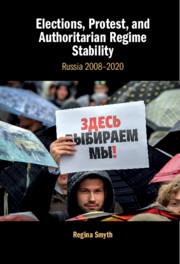Book contents
- Elections, Protest, and Authoritarian Regime Stability
- Elections, Protest, and Authoritarian Regime Stability
- Copyright page
- Dedication
- Contents
- Figures and Tables
- Acknowledgments
- 1 Elections, Protest, and Regime Dynamics
- 2 Winning Elections
- 3 The Long Game
- 4 The Unexpected Power of Weak Opposition
- 5 The Vote Protest
- 6 The Polls Close and Two Movements Emerge
- 7 Protest and Rally Dynamics
- 8 The Perpetual Campaign
- 9 2018–2020
- Book part
- References
- Index
4 - The Unexpected Power of Weak Opposition
Organizations, Frames, and Political Opportunities
Published online by Cambridge University Press: 16 October 2020
- Elections, Protest, and Authoritarian Regime Stability
- Elections, Protest, and Authoritarian Regime Stability
- Copyright page
- Dedication
- Contents
- Figures and Tables
- Acknowledgments
- 1 Elections, Protest, and Regime Dynamics
- 2 Winning Elections
- 3 The Long Game
- 4 The Unexpected Power of Weak Opposition
- 5 The Vote Protest
- 6 The Polls Close and Two Movements Emerge
- 7 Protest and Rally Dynamics
- 8 The Perpetual Campaign
- 9 2018–2020
- Book part
- References
- Index
Summary
Chapter 4 focuses on the Russian case, showing that even weakly organized oppositions can influence electoral outcomes. The chapter demonstrates how central concepts in social movement theory, social movement organizations, opportunity structure, and mobilizing frames also influence the information environment in which elections are held. The narrative illustrates that between 2008 and 2011, the Russian opposition altered popular perception by creating a coalition across different types of protest groups. It also underscores that the opposition’s unwillingness and inability to work with labor organizations limited the reach of the nascent movement and precluded cross-class coalition that is central to regime breakthrough. Nonetheless, these changes generated new information about the structure and reach of opposition as the 2011 election approached. The regime response included organizing new, state-sponsored organization, the articulation of competing frames, and the judicious use of repression. While these efforts shored up core regime support they failed to stifle opposition signals and may have demonstrated growing fears as the next election cycle approached.
Keywords
- Type
- Chapter
- Information
- Elections, Protest, and Authoritarian Regime StabilityRussia 2008–2020, pp. 76 - 100Publisher: Cambridge University PressPrint publication year: 2020

